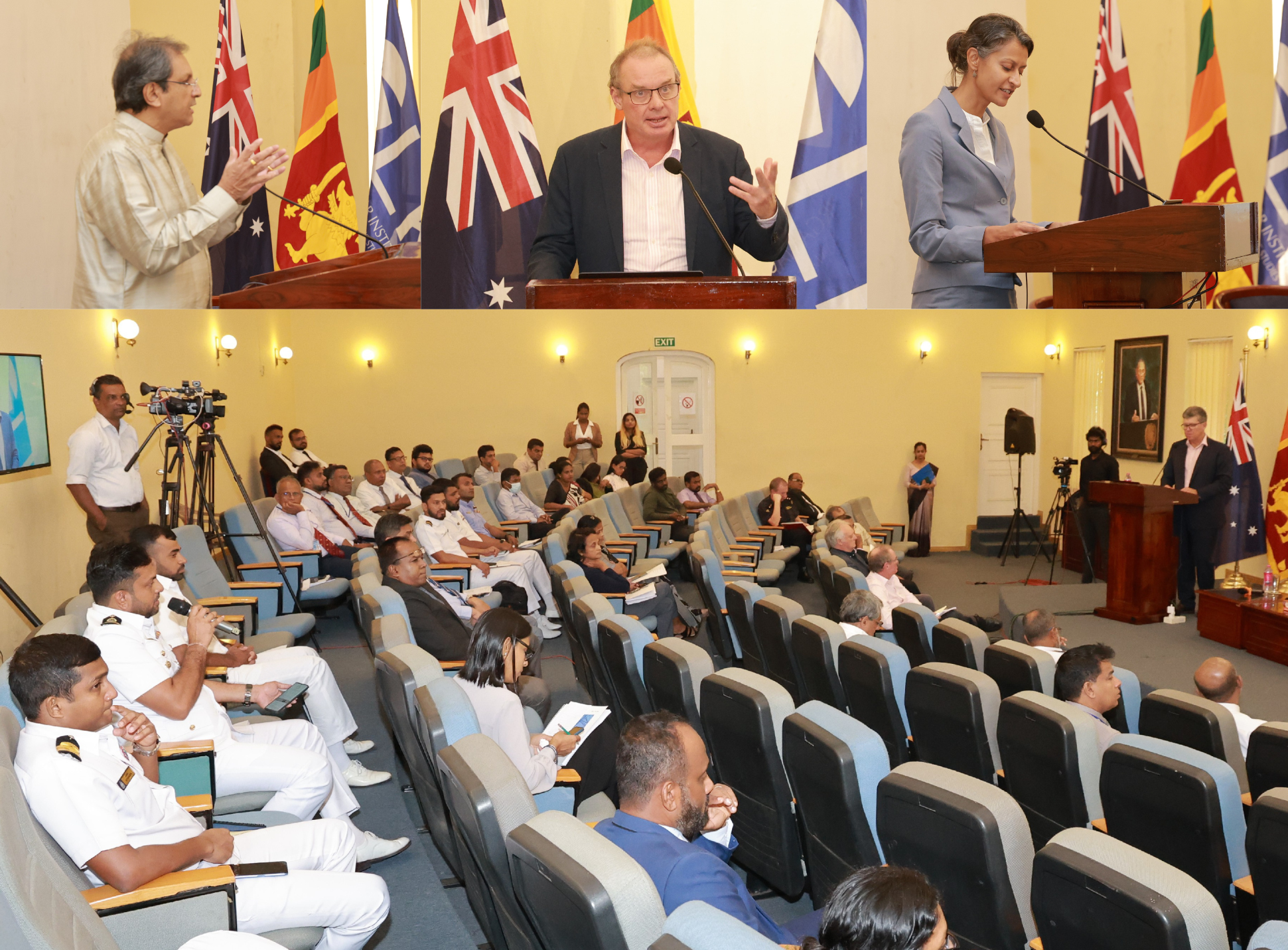June 6, 2024 Reading Time: 4 minutes

Reading Time: 4 min read
A workshop on developing Sri Lanka’s Maritime Domain Awareness (MDA) was hosted by Lakshman Kadirgamar Institute (LKI), in collaboration with the Australian High Commission and the National Security College of the Australian National University held at the Lighthouse Auditorium on 6 June 2024. A special report assessing Sri Lanka’s maritime challenges and MDA capabilities, prepared by Dr. David Brewster, Captain Simon Bateman (Rtd.), and Dr. Anthony Bergin from the Australian National University’s National Security College, was presented and discussed at the workshop. This all-day event brought together key representatives from Sri Lankan maritime agencies to discuss the unique challenges and opportunities in enhancing Sri Lanka’s maritime domain awareness. The Commander of the Sri Lanka Navy attended the concluding discussions.
Welcoming the gathering, Executive Director of the LKI Ambassador Ravinatha Aryasinha highlighted the workshop’s importance in fostering stronger dialogue on Sri Lanka’s MDA and in addressing critical issues affecting the regional maritime security of the Indian Ocean. He said the workshop represents an important step towards ensuring sustainable development and protection of maritime resources, aligning with Sri Lanka’s chairmanship of the Indian Ocean Rim Association (IORA) and its contribution until recently as the chair of the Maritime Safety and Security Working Group.
Dr. Brewster explained that the report aims to provide a fresh perspective on Sri Lanka’s maritime challenges and capabilities, serving as a tool for future MDA initiatives. “We hope that this report, when finalized, will become a good reference work for addressing Sri Lanka’s maritime challenges,” he stated. He emphasized the importance of a whole-of-government approach in addressing maritime challenges helps to guide Sri Lanka’s partners in developing the maritime sector to coordinate better and minimize overlaps when implementing programs. “The recommendation included in the report aim to provide a basis for discussion and debate for Sri Lanka to decide what is best for Sri Lanka” he stressed.
Australian Deputy High Commissioner Lalita Kapur expressed appreciation for the close bilateral ties between Sri Lanka and Australia. Noting the timely nature of the workshop,she recognized Sri Lanka’s potential to become a leading maritime hub in the Indian Ocean and reiterated Australia’s commitment to support Sri Lanka in navigating maritime challenges and opportunities. “We want to support Sri Lanka as it charts its own path in understanding its maritime domain,” she noted, emphasizing Australia’s long-term commitment to promoting a peaceful, resilient, and prosperous Indian Ocean region.
Thanking the efforts made by the team of experts from ANU, Mr. Rizvi Hassen, Director General of the Environment and Climate Change Division of the Ministry of Foreign Affairs commented on the significance of developing Sri Lanka’s MDA capabilities. He highlighted the challenges ahead and the importance of a robust framework for MDA development. “We need to ensure sustainable development and protection of maritime resources,” he stated, underscoring the workshop’s role in achieving these goals.
There were two panel discussions. The first panel, titled ‘Achieving MDA and Maritime Governance Utilizing National Capabilities,’ included panelists Mr. Edward Caslake, Commodore Aruna Weerasinghe, Dr. Nuwan Gunawardane, and Mr. B.H.J. Premathilaka. They discussed the importance of sharing information and resources to strengthen Sri Lanka’s MDA capabilities. Dr. Brewster applauded Sri Lanka’s efforts in furthering its MDA, despite the impact of the 30-year civil war. He highlighted the development of systems such as the Vessel Monitoring System (VMS) and the use of technologies like Sea Vision and Skylight. Dr. Brewster also stressed the need for a connected approach to developing MDA for Sri Lanka, including the creation of a national MDA center that could integrate with regional centers to facilitate information sharing.
The second panel focused on the topic of ‘Regional Cooperation for MDA’ with participants including Mr. Maurice Brownjohn, Lieutenant Commander Thalagala, Mr. Asila B. Rekawa, and Dr. Prabhath Jayasinghe. Mr. Maurice Brownjohn, a fishery consultant and Board Director of the PNG Fishing Industry Association, discussed the successful collective management and sovereignty of fisheries in the Pacific Islands and the potential lessons for Sri Lanka. He emphasized the importance of independence from donor influence and advanced monitoring technologies. He also elaborated on the use of oceanographic models in search and rescue operations and the importance of validating these models to enhance search and rescue accuracy. The panelists highlighted several critical needs and recommendations emphasizing the necessity for better underwater surveillance equipment to ensure the safety of undersea cables and underscored the growing importance of underwater domain awareness (UDA) in the Bay of Bengal. The need for clear identification of responsibilities among various agencies to improve coordination during maritime incidents was also discussed, along with the importance of ensuring that agencies are properly equipped and trained. Additionally, the discussions stressed the importance of adequately resourcing relevant agencies to fulfill their legislative obligations effectively and proposed establishing a Maritime Safety and Environment Authority to enhance coordination and effectiveness in maritime safety and environmental protection.
Captain Bateman and Dr. Brewster acknowledged the potential for improvement in the report and expressed their enthusiasm for receiving detailed comments. They aim to refine the recommendations before finalizing the report and sharing it with government authorities to create a robust national maritime strategy, facilitating greater coordination among agencies for more effective maritime governance in Sri Lanka.
The workshop featured local and international experts, including representatives from the Sri Lanka Navy, the Department of Fisheries and Aquatic Resources, the Department of Coast Conservation and Coastal Resource Management, the Maritime Environment Protection Agency, the National Aquatic Resources Research and Development Agency, and researchers from the Lakshman Kadirgamar Institute (LKI).